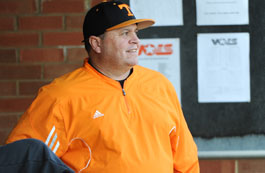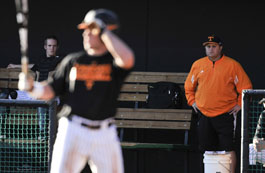Feb.
14, 2012
click here
for feature on Mike Zunino
click here
for CBI SEC preview
click here for coaches'
SEC preseason poll
Nine Innings with Dave Serrano
By Sean Ryan
CollegeBaseballInsider.com
Co-Founder
sean@collegebaseballinsider.com
@collbaseball
 When
the Tennessee head coaching position opened, the Volunteers were
able to land one of most successful coaches in college baseball
in former UT assistant Dave Serrano. When
the Tennessee head coaching position opened, the Volunteers were
able to land one of most successful coaches in college baseball
in former UT assistant Dave Serrano.
Serrano has posted a record of 289-139-1 (.675)
in seven seasons as a Division I head coach. He was head coach
at UC Irvine from 2005-07 before taking over at Cal State
Fullerton for the past four years, registering four straight
40-win seasons with the Titans. Serrano guided both schools to
the College World Series, one of only 11 coaches to take two
different programs to Omaha.
A native of Torrence, Calif., Serrano has learned
from some of the top coaches in the nation. He played under and
coached with George Horton at Cerritos College and pitched for
Augie Garrido at Fullerton. Serrano was an assistant for two
seasons at Tennessee (1995-96) under Rod Delmonico. He returned
to Fullerton as an assistant under Horton from 1997-2004 before
going to UCI.
Serrano recently took time to answer our
questions.
 First Inning – How difficult was it to leave
Cal State Fullerton? First Inning – How difficult was it to leave
Cal State Fullerton?
I’ve never regretted any of my
decisions along my career path to get to where I’m at today.
With all due respect to Cal State Fullerton and its wonderful
program, my belief is that Tennessee is a better fit for me and
my family. I will always cherish my years at Fullerton, but my
future is now all Tennessee.
Second Inning – You played for George Horton at Cerritos
College, and Augie Garrido at Cal State Fullerton. What was it
like playing for each of them, and what are some things that you
learned from them that have helped you as a coach?
This is an easy question to answer. Coach Horton has played a
huge part in where and what I am today. He taught me about
leadership of young men, attention to detail, creating a winning
atmosphere and delegating and trusting your coaches. Any and all
success I’ve had and hopefully will continue to have has Coach
Horton’s signature somewhere on it. I feel so fortunate to be
able to say that I’ve played or coached with three National
Coaches of the Year in Augie Garrido, George Horton and Rod
Delmonico. I’m not sure many other coaches out there have had
that wonderful opportunity like I have.
Third Inning – Speaking of Cerritos, how do you explain the
number of successful college head coaches who have played or
coached at Cerritos?
Well, as I’ve said to many people over the years, Wally
Kincaid, who orchestrated Cerritos, was the John Wooden of JC
baseball in his day. So it’s not surprising, at all, how many
great coaches have come from that tree.
Fourth Inning – How did you get into coaching, and why?
When my career was over at Cal State Fullerton, my current
assistant and good friend Bill Mosiello and I were running a
Connie Mack team for then head coach at Cerritos College George
Horton. When Augie Garrido left Fullerton for the first time to
take over at Illinois, he took Jody Robinson who was Coach
Horton’s assistant. This opening allowed Coach Horton to give a
great opportunity for Bill and myself to coach at a very young
age (23) at a great program like Cerritos. My decision to want
to be a coach was purely to help kids and players prosper, not
just in the game but life as well, just like some coaches and
mentors did for me in my career. I look back at that opportunity
and I’m so glad I took advantage of it to get me to where I am
today.
 Fifth Inning – Who were some of your pitching influences
growing up and as a player? And who are some of them now? Fifth Inning – Who were some of your pitching influences
growing up and as a player? And who are some of them now?
The pitching philosophy of Wally Kincaid has made the
biggest influence on me as a player and coach, but to this day I
watch and observe many great coaches out there and take what
will fit into my beliefs and system.
Sixth Inning – What were your biggest challenges going from a
pitching coach to a head coach, and how did you adapt?
I’m not sure I would say there were any challenges, but I
realized right away that I had to be as organized as ever
before. You’re pulled in so many different directions, not just
on the field but off the field as a head coach. I believe my
transition was made smoother because of the power and role that
was delegated to me for so many years as George Horton’s
assistant coach. That’s where a great support staff of assistant
coaches that you trust and delegate to, like I’ve been lucky to
have at each stop, has allowed me to continue to be a pitching
coach and head coach at the same time.
Seventh Inning – How has Cal State Fullerton done what it's
done on the national scene, and how has it been able to maintain
its status as a national power?
It obviously all starts with Augie Garrido, who took a
baseball program at a commuter school in California and did more
with nothing than anyone can even imagine. People see Fullerton
now for what it’s become facility wise and believe they are on
the same scale as others. They have no idea what it was like
when Augie brought the first two national championships home. I
believe the program has maintained its national prominence
because its location to some of the best talent in the country
and because players go there to win and go to Omaha. Lastly, the
players, coaches and assistant coaches who it’s been handed down
to over the years know what is expected of them to maintain the
success level of all past Titan greats.
Eighth Inning – What attracted you to return to Tennessee,
and were there any concerns about coming East after so many
years on the West Coast?
The University of Tennessee itself, the SEC and the
challenges and opportunities that will present and the fact that
I can be part of building a program that has had some tradition
of success back to where it belongs. I am also coming back to a
place where I spent two great years as an assistant (1995-96)
and know that it was a program that fit my needs and
personality. Lastly, being able to put my wife and three boys
into a great community and a true college town and atmosphere
was something I couldn’t pass up. Probably my only concern to
leaving the West Coast is the change in climate. With our indoor
facilities and indoor batting tunnels, however, we should still
never skip a beat in development with our teams.
Ninth Inning – What are some of your challenges at Tennessee,
and what steps are needed to elevate the Volunteers to the top
tier of the SEC?
I see challenges as we have so many great programs to catch
back up with in the SEC. Besides that I don’t see us as having
challenges. We have the facilities, a great university to
recruit to, total support from our administration and a
community that wants and will support us when we start winning
on a consistent basis again. I think we started taking steps
forward in every area of this program last June when we were
hired to work to elevate Tennessee back to being a top tier
program. It’s a daily commitment that will be expected of every
coach and player in this program.
(photos courtesy of UTAD
Photography)
|